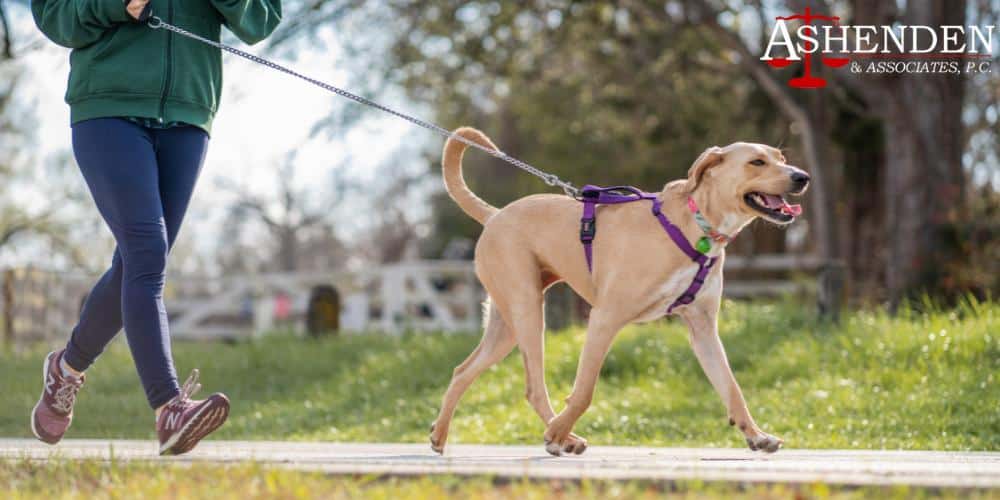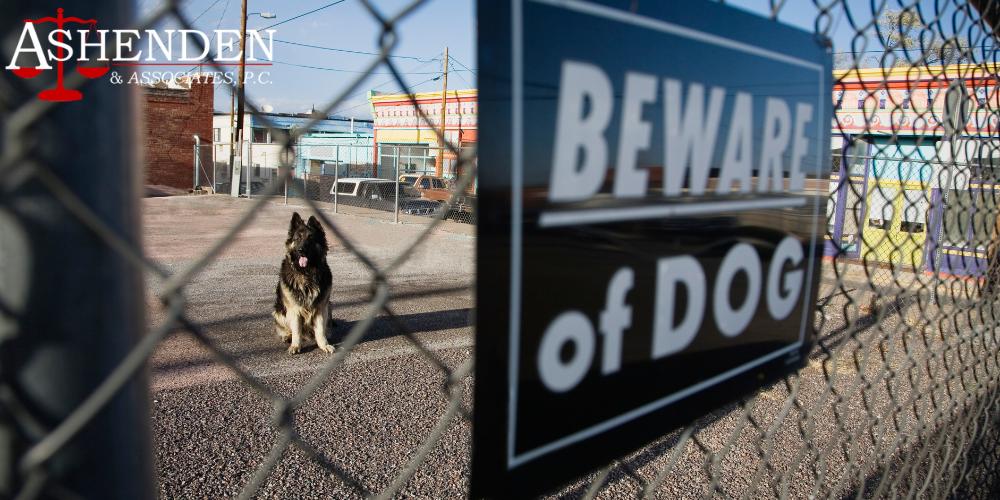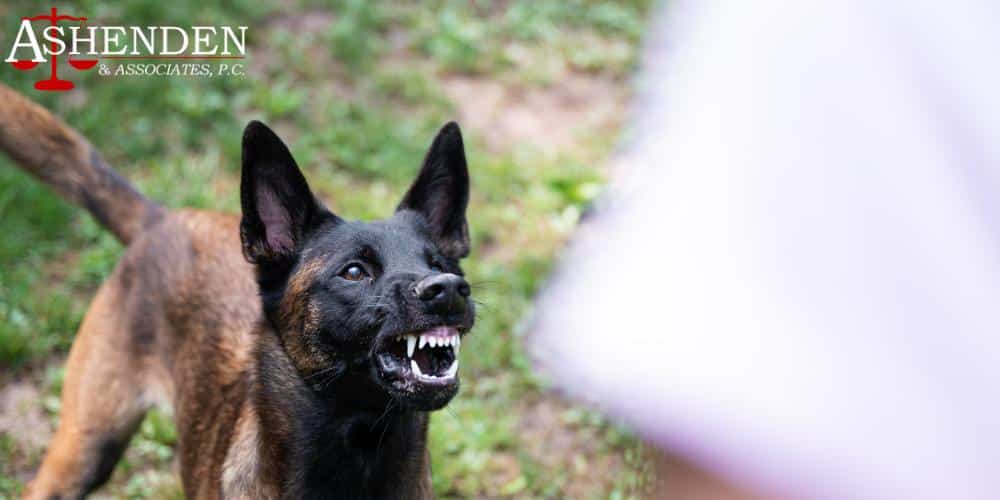We Go The Extra Distance For Our Clients
Practice Areas
Sandy Springs Dog Bite Lawyer
Our sweet, furry dog friends would never purposefully cause any harm most of the time, though there are aggressive dogs in the world that do attack. An attack by a dog can cause serious injuries and disfigurement that may result in plastic surgery. Dog bites, if severe, can also result in massive medical expenses and lost wages for the victims and even their family members. Luckily, victims typically recover a decent amount of compensation through a dog bite claim.
A Sandy Springs dog bite lawyer at Ashenden & Associates can help you recover compensation by filing a lawsuit against the dog owner. Please note, there are some cases we’ve handled that have settled before filing suit. Give our office a call at 770-394-8909 to schedule a free consultation for your dog bite case and consult with us regarding whether a lawsuit would be advisable.

What is Considered a Dangerous Dog in Georgia?
Under the Responsible Dog Owner Act, a “dangerous dog” is defined as a dog that:
- Goes beyond growling, barking, or baring their teeth, and does something aggressive enough that someone could reasonably believe the dog poses a serious threat.
- Bites and significantly punctures a person’s skin but does not cause “serious injury.”
- Kills another animal while away from the owner’s property. Exceptions to this would be if the dog is a herding dog, hunting dog, or predator control dog.
Georgia Dog Leash Laws
The state of Georgia does not have a statewide leash law. Although, many counties and cities with the state have their own rules on leashing. For example, in Fulton County, it’s unlawful for an owner, custodian, or keeper of a dog to allow the dog to run at large. In public settings, dogs must be restrained by a leash that is no more than six feet in length and controlled by a competent person.
Georgia’s Responsible Dog Owner Act
Georgia’s dog bite law was passed in 2012. Under that law, the term “owner” includes anyone who owns, harbors or has custody of the dog that attacked someone. For instance, if you are watching a dog for a family member and it attacks someone, then you will be held liable for damages.
Dog groomers, boarders, and veterinarians may also be held liable if a dog under their care bites someone. Parents can be responsible if their child’s dog attacks someone, and in certain circumstances, even landlords might be held liable.
Under the Georgia Responsible Dog Owner Act dog owners can be held liable when dogs under their control seriously injure a person or another animal. Serious physical injuries are more than just a scratch. They include injuries that:
- Require multiple stitches, hospital admission, or plastic surgery
- Become life-threatening
- Result in death
- Cause broken or dislocated bones
- Seriously impair someone’s health, such as through infection or contagious disease

What to Do After a Dog Bite
If you or a loved one has been injured as a result of a dog bite, you should take the following steps:
- Gather names, phone numbers, and any other information of the owner
- Gather names, phone numbers, and any other information of any witnesses
- Take pictures of your injuries
- Report the accident to the local authorities
- Get immediate medical attention, if necessary
Types of Dog Bite Injuries
Oftentimes, dog bite victims suffer serious injuries from their attack. The most common injuries resulting from dog bites include:
- Permanent scarring and disfigurement
- Finger or toe amputations
- Infections and viruses such as rabies or tetanus
- Emotional trauma such as PTSD, increased anxiety around animals, panic attacks, etc.
- Deep puncture wounds in the face, head, neck, and limbs
- Nerve damage
- In rare cases, wrongful death
Why Do Dogs Bite?
With rare exceptions, dogs typically do not bite out of nowhere. From small nicks that don’t break the skin to serious bites that may require urgent medical care, there are multiple reasons a dog might feel the need to bite. Unfortunately, most people often miss the warning signs that a bite could happen. Most dogs will try to communicate discomfort prior to them actually biting, such as barking, growling, or snapping at the air. There are various reasons that dogs may bite, including:
- Being scared or startled
- Protecting or guarding
- Frustration
- Pain or discomfort
- Illness

Most Common Types of Dogs That Engage in Attacks
Any dog can bite: big or small, male or female, young or old. Even the cuddliest, sweetest pet can bite if provoked. It is not just the dog’s breed that determines whether it will bite. Although, according to statistics, the top dog breeds with the most bite attacks are:
- Pit Bull
- Rottweiler
- German Shepherd
- Husky
- Alaskan Malamute
- Doberman Pinscher
- Chow Chow
- Great Dane
- St. Bernard
- Akita
- Wolf-Dog Hybrid
If I’m Attacked By a Dog, Can I Sue?
Under the Georgia dog bite laws, dog bite victims can sue if a dog causes them serious injury. They need to provide substantial evidence to prove the cause and severity of your injuries. Evidence may include witness testimony and medical records.
Dog bite victims must also demonstrate that you were legally on the property when the dog attacked and did nothing to provoke the attack. They also must show that the dog’s owner either should have known the dog was aggressive or was careless in trying to prevent the attack.
Dog Attack Penalties in Georgia
There are certain requirements of dangerous dog owners that must be met according to the Responsible Dog Owner Act. Any owner who violates these rules must give up the dog to a dog control or law enforcement officer. The owner can retrieve the dog after showing proof of compliance with the responsible dog rules. The owner must also pay fees to cover confiscation and the government’s cost of housing the confiscated dog. If the owner does not retrieve the dog within twenty days, then the government can euthanize the dog and the owner will still be responsible for the costs of the dog’s housing in addition to euthanasia expenses. These requirements include:
- Registering the dog and obtaining a dangerous dog certificate within 30 days of moving to Georgia or within 10 days or moving to a new jurisdiction.
- Keeping the dog in a secure, locked enclosure on the owner’s property.
- Posting “dangerous dogs” signs at every entrance of the owner’s property.
- Not taking the dog off the property, unless the dog is in a locked crate or on a leash less than six feet long.
- Notifying the local dog control officer within 24 hours if the dog dies, attacks a human, or is on the loose.
In addition to the rules of the Responsible Dog Owner Act, any owner that commits a violation can also face criminal charges. In most cases, the offense is a misdemeanor that is punishable by up to one year in jail, a fine up to $1,000, or both. Certain offenses related to a dog classified as vicious can result in the owner being convicted of a “misdemeanor of high and aggravated nature” which is punishable by up to one year in jail, a fine up to $5,000, or both.
If an owner of a dangerous or vicious dog has been convicted of violating any provision of the Responsible Dog Owner Act, and then the dog seriously injures someone, the owner could be charged with a felony and, if convicted, receive between one and ten years in prison, a fine between $5,000 and $10,000, or both.
When Would a Georgia Dog Owner Be Liable for Damages in a Dog Bite Case?
Dog owners hold the responsibility to keep others safe from their pets. When a dog bite occurs in Georgia, the dog owner is held liable for any damages and is considered negligent according to a modified version of the One Bite Rule. In order to prove liability for a dog bite in Georgia, the dog bite victim and their attorney must show:
- The dog is considered a “vicious or dangerous animal.”
- The owner was careless with the dog or the dog was not on a leash at the time of the attack.
- The injured person did not provoke the dog.
However, there are two defenses against the Georgia dog bite law that apply:
- Provocation: If the victim provoked the dog, then the owner bears no liability.
- Trespassing: Owners generally hold no liability to a trespasser, even without a “Beware of Dog” sign. However, a property owner cannot “sic” their dog on a trespasser unless they reasonably believe that the trespasser intends to cause immediate bodily harm.
An experienced lawyer can help you in determining the liable party, gathering evidence, and establishing the full extent of your injuries.
Damages for Dog Bite Injuries
If you are a victim of a dog attack, you may be eligible to file a dog bite injury claim and may recover damages you incur as a result. The most common damages suffered for dog attack victims include:
- Medical bills
- Lost wages and income
- Pain and suffering
- Emotional distress and psychological trauma
- Property damage
- Loss of enjoyment
- Permanent scarring or disfigurement
Dog bite claims are usually paid through the dog owner’s homeowners insurance. Some policies, however, exclude bites by certain breeds of dogs, such as Pit Bulls and Rottweilers. You should not forego a claim against a neighbor or someone you know just because you think it will harm them financially. You are most likely not taking money out of their pocket.
Statute of Limitations for Dog Bites in Georgia
In Georgia, dog bite claims almost always fall under the “personal injury” category, so the state’s statute of limitations for personal injury cases usually applies. This gives you two years from the date of the incident to file a claim.
How Can I Avoid an Attack?
Most dog bites are preventable, and there are many things that you as an owner or victim can do to help prevent them.
- Socializing your dog: This can help your dog feel at ease in different situations. By introducing your dog to people and other animals while it’s a puppy, it feels more comfortable in different situations as it gets older.
- Being a responsible dog owner: Responsible pet ownership builds a solid foundation for dog bite prevention. Basics of responsible dog ownership that can help reduce the risk of dog bites include carefully selecting the dog that’s right for your family, proper training, regular exercise, spaying or neutering your pet, and leashing your dog in public.
- Educating your family: Educate yourself and your children about how or whether to approach a dog.
- Avoiding risky situations: It’s important to know how to avoid risky situations and to understand when you should and should not interact with dogs. You should avoid petting a dog in the following situations:
- If the dog is not with its owner
- If the dog owner does not give you permission to pet the dog
- If the dog is on the other side of a fence, don’t reach through or over a fence to try and pet a dog
- If a dog is sleeping
- If a dog is eating
- If a dog is sick or injured
- If a female dog is resting with her puppies or seems very protective of her puppies
- If a dog is playing with a toy
- If a dog is growling or barking
- If a dog seems to be hiding or seeking alone time
- Paying attention to body language: Reading a dog’s body language can also be helpful. Just like people, dogs rely on body gestures, postures, and vocalizations to express themselves and communicate. While we can’t always read a dog’s body language accurately, it can give us helpful clues as to whether a dog is feeling stressed, threatened, or frightened.

Call a Sandy Springs Dog Bite Lawyer at Ashenden & Associates Today
If you find yourself involved in a dog bite claim in Sandy Springs, you need an experienced dog bite attorney to answer your legal questions. You may be able to seek financial compensation from the dog’s owner and we have the skills and resources to help you receive the maximum compensation you deserve. Give Ashenden & Associates a call today at 770-394-8909 to schedule a free case evaluation.

